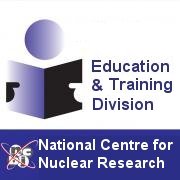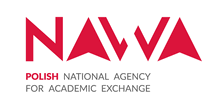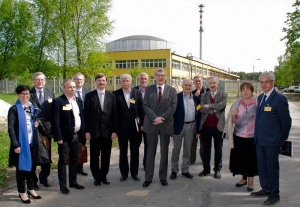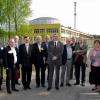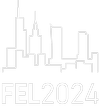Polish MPs met with IChTJ and NCBJ management
2015.05.15 9:03 - adminSome members of Seym (Polish Parliament) Subcommittee on Science and Higher Education visited Świerk on May 12, 2015 and met with representatives of IChTJ and NCBJ Management. The meeting attendees included: Dr. Piotr Paweł Bałuć, Chairman of Seym Committee on Education, Science & Youth; Prof. Jan Kaźmierczak, Chairman of the Subcommittee; Lucjan Marek Pietrzczyk, Dr. Andrzej Smirnow, Wiesław Suchowiejko, Ryszard Zawadzki, Prof. Jan Żyżyński, Subcommittee Members. Government was represented by Prof. Marek Ratajczak, Secretary of State in Ministry of Science and Higher Education. Institute of Nuclear Chemistry & Technology (IChTJ) was represented by Prof. Andrzej Chmielewski, Director, and Prof. Aleksandra Bilewicz. NCBJ was represented by Prof. Grzegorz Wrochna (Director General), Prof. Ewa Rondio, Prof. Krzysztof Wieteska, Zbigniew Gołębiewski, Adam Hryczuk, Marek Juszczyk (Deputy Directors), Prof. Krzysztof Kurek (Scientific Secretary), and Dr. Paweł Sobkowicz (Technology Transfer Division Head).
The „Nuclear Research and Technologies in NCBJ” presentation by Prof. Kurek opened the main part of the meeting. It showed NCBJ’s role in the landscape of Polish science, economy and medicine, as well as gave a vision of NCBJ’s future based on expanded research infrastructure of the Institute. Prof. Kurek commented on dangers ensuing from trivialization of science by media, a phenomenon manifesting itself by equating the notion of science with the notion of innovation. – “Inadequate funding of research infrastructure is not only a barrier for NCBJ growth, it is also a serious general threat for science in Poland. European funding requires co-financing by private money, which precludes development of large research facilities. Relatively large EU funds may that way be dispersed among a large number of projects, each of a very limited scientific and economic impact. Global trend is different: to guarantee high quality of research, expensive state-of-the-art research infrastructure is developed in large facilities. Breakthrough in science is not possible without pure research conducted in such facilities. Truly innovative solutions so desirable in national economy are just final results of such breakthroughs” – said Prof. Kurek.
In a next part of the meeting Dr. Sobkowicz comprehensively presented the subject of practical applications of results of research conducted in NCBJ in power industry, medicine and society. Impressive achievements and benefits resulting from implementation of research conducted in IChTJ were presented by Prof. Chmielewski in the “Applications of Nuclear Chemistry and Irradiation Technologies” presentation.
The meeting was summed up by Prof. Wrochna who addressed in his concluding speech several issues raised by MPs concerned with energy security of the country. „Majority of topics presented to-day by our Institutes are not directly connected with nuclear power. However, our success stories (e.g. manufacture of radiopharmaceuticals) would not have been possible without decisions to develop research base for nuclear power industry made many years ago. To-day science in Poland faces not only the problem how to consolidate dispersed means allocated for many relatively small projects. Lack of economically sound Polish companies capable to risk their money to finance science is another key barrier in development of research institutes” – said Prof. Wrochna.
A visit to MARIA, the sole nuclear reactor operated in Poland and the largest research facility in Poland was the last point in the meeting agenda.


